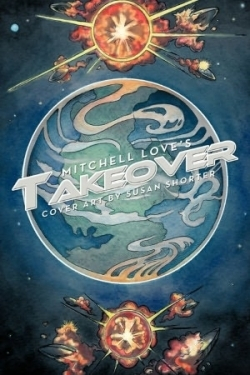Takeover
Takeover marks the first installment in a new science-fiction series by Mitchell Love in which two planets collide in a colossal war. A peaceful planet, ruled by King Allawen and Queen Vountin, is threatened by an insidious plan for domination by Torfor, the disgruntled head of the planet’s Space Exploration Committee. After losing an important promotion, Torfor aligns himself with the ruler of an enemy planet and plots the downfall of his king and queen, determined to realize his vision of power and success.
Set in a futuristic galaxy where space exploration and the mapping of distant galaxies is the norm, Takeover switches between the perspectives of a few main protagonists, each determined to fulfill their destinies. Torfor, and his loyal son Valhi, hungry for revenge, seek to usurp the power of the royal family and aid in the humiliation and defeat of their own planet. All the while, Prince Sincon fights to maintain his family’s power and return the planet to a time of peace.
Takeover is based on a compelling and time-tested concept—the battle between good and evil—and is explored through the lens of the titillating human vices of jealousy and greed. This premise suggests a level of complexity and depth that the book, unfortunately, does not deliver. In its current form, Takeover reads too much like a quick synopsis of a potentially good idea, but does not work as a fully developed novel. Events are listed one after another in vague, uninspired language that creates a monotony that further highlights the author’s failure to abide by the classic “show, don’t tell” rule. For example, a potentially riveting fight scene between Sincon and his captors is watered down to a skeletal outline: “Two guards come in and take away Sincon, and then everyone in the cell gets up and attacks the chief. But some of the guards get in between the chief and the prisoners.” This is an outline—not a description—and like almost every scene in this book, it needs to be fleshed out with visual details and emotional depth.
One of the most important elements of good science fiction is the creation of a plausible world. The mere insertion of spaceships and galaxies does not automatically create a futuristic setting. Details—what does this world look like? What are the cultures and traditions of the people? What are their histories? How does their world function?—can be completely fictitious and original, but they are details that must exist in order for the reader to believe in the world the author has created and care for the characters and the struggles they face. Takeover lacks the details needed for believability. Other than job titles and individual names, very little is known about the worlds where the main characters reside.
Love clearly recognizes that science fiction can be a valuable way of looking at the deeper issues that affect the way we live our lives. The focus on interior motivations for seemingly evil characters is refreshing and has potential. However, Takeover must be fleshed out to function effectively as a novel.
Reviewed by
Shoilee Khan
Disclosure: This article is not an endorsement, but a review. The publisher of this book provided free copies of the book and paid a small fee to have their book reviewed by a professional reviewer. Foreword Reviews and Clarion Reviews make no guarantee that the publisher will receive a positive review. Foreword Magazine, Inc. is disclosing this in accordance with the Federal Trade Commission’s 16 CFR, Part 255.

